

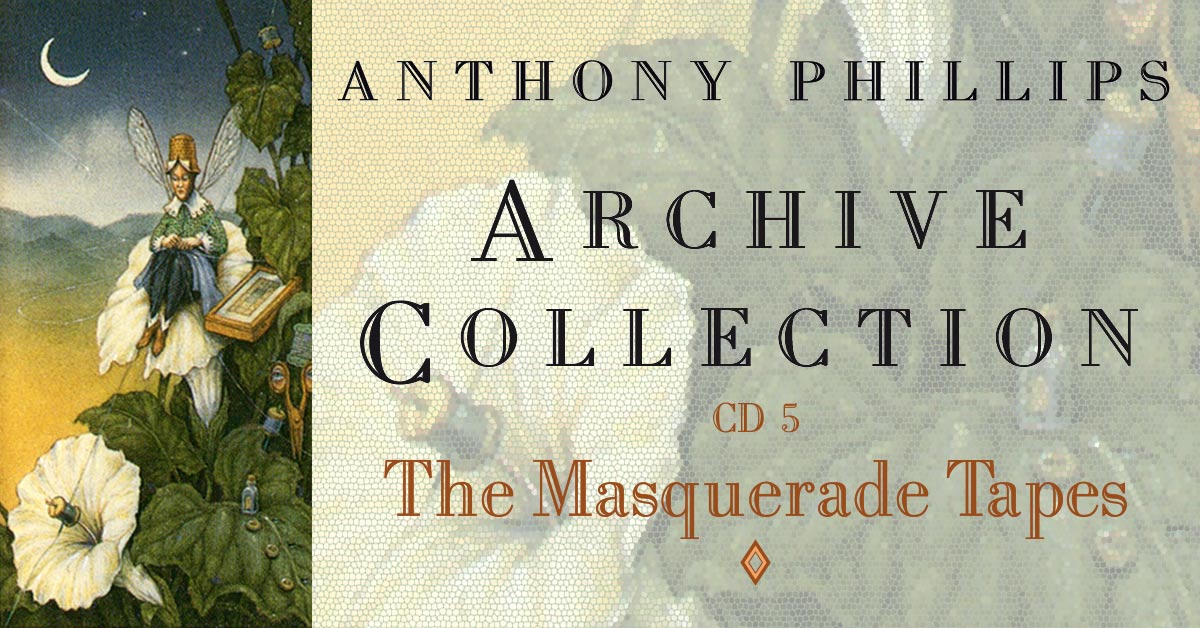
The fifth CD of the new Archive Collection 5CD box set contains a real treasure with The Masquerade Tapes, which we want to look at in detail in this special. For this purpose, we have compiled some background information on the children's book, which serves as a template, as well as on the musical, which only had a short life.
Background Story I: The children's book as a template
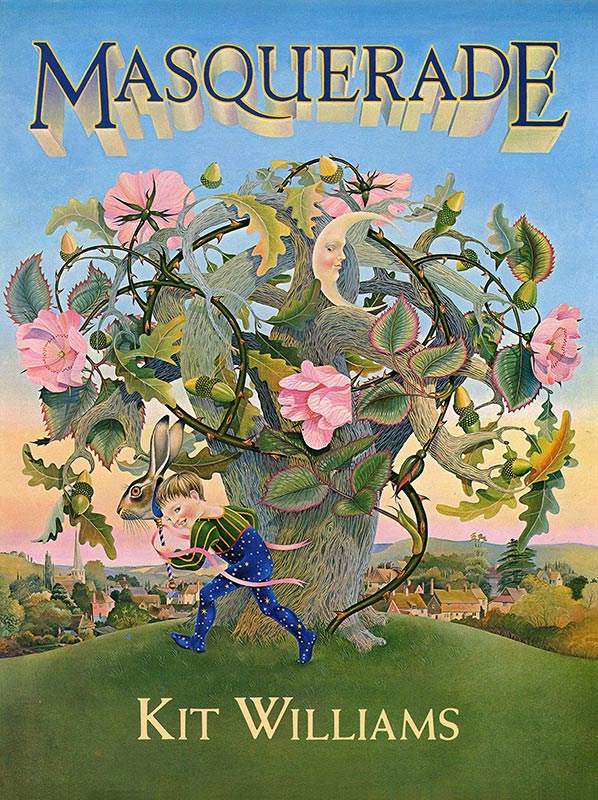 The British author, illustrator and painter Christopher "Kit" Williams was born on 28 April 1946. His book Masquerade and the coded clues to the hiding place of a bejewelled golden jewel in the shape of a rabbit caused a hype. The object of desire was buried in Britain in 1979 and found in 1982. A scandal was caused in 1988 by a publication in the Sunday Times, which revealed that the finder of the treasure had not solved the mystery in the regular way. Rather, he had received inside information from Veronica Robertson, the author's former partner. Detailed information about this can be found at Wikipedia at this Link.
The British author, illustrator and painter Christopher "Kit" Williams was born on 28 April 1946. His book Masquerade and the coded clues to the hiding place of a bejewelled golden jewel in the shape of a rabbit caused a hype. The object of desire was buried in Britain in 1979 and found in 1982. A scandal was caused in 1988 by a publication in the Sunday Times, which revealed that the finder of the treasure had not solved the mystery in the regular way. Rather, he had received inside information from Veronica Robertson, the author's former partner. Detailed information about this can be found at Wikipedia at this Link.
The story Kit Williams tells in this book "sounds like a fairy tale, of love, of adventure, of lost fortune, and a jewel of solid gold" - according to the text in the preface.
Masquerade established the genre of the so-called armchair treasure hunt. The book was translated into German and French, among other languages, and was very popular in the United States, Australia, South Africa and Japan.
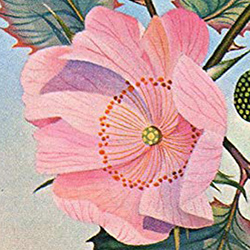
Background Story II: The Musical-Project
The popularity of the book inevitably led to a number of different proposals, including the idea of telling the story in a musical. Kit Williams knew Tony Smith (who was managing both Genesis and Ant at the time) and the management of Hit and Run Music acquired the theatrical rights to the book. A number of musicians were then approached if they would be interested in writing the musical, including producer Rupert Hine, who had previously worked with Ant on Wise After The Event and Sides. Rupert found the idea of Masquerade interesting and agreed to take part. He travelled to Gloucestershire to meet and spend some time with Kit Williams and to talk to him about a possible musical. Regarding the lyrics for the show, it was agreed that Rupert Hine's friend Jeannette Obstoj, who had already written lyrics for Hine's solo releases as well as for the band Quantum Jump (with bassist John G. Perry).
Another suggestion was that Ant could co-compose the music, although it was not entirely clear how this would work in practice. Ant: "As things turned out we had this very strange arrangement. Rupert and Jeanette, his girlfriend who wrote the lyrics, were supposed to do the main writing and I was sort of involved on the side to help write parts or do some arrangements. Tony Smith was vaguely involved with the coordination of the whole thing but his now wife Suzie Rogers was involved in the meetings. She didn’t know any of us very well and the areas of general activity and parameters of who was going to do what by when were all terribly vague. It got very complicated because Rupert was producing people at the time and was never really around so I found myself having these odd sessions with Jeanette where we sort of half wrote things. Because I wasn’t supposed to be the main writer, I didn’t know how far to push it."
 Despite these unusual circumstances, Ant found it interesting to write for a musical where the drama and emotion is conveyed through the music. He remembers: "I found the whole idea rather fascinating with the various characters in the story such as Tara Treetops which is where Tara’s Theme stems from. It was good fun not having to take things so seriously and act out a few parts through the music as you might do in drama, which does allow you to explore unusual areas. So I wrote lots and lots of stuff but because I was treading on toes to a certain extent regardless of whether it was good or bad a lot of it got rejected as it was basically supposed to be Rupert’s thing but Rupert wasn’t really working on it. I think he wanted to do more on it but he was going where the money was, which was the production side of things. It was ultimately a curiously ill-conceived scenario"
Despite these unusual circumstances, Ant found it interesting to write for a musical where the drama and emotion is conveyed through the music. He remembers: "I found the whole idea rather fascinating with the various characters in the story such as Tara Treetops which is where Tara’s Theme stems from. It was good fun not having to take things so seriously and act out a few parts through the music as you might do in drama, which does allow you to explore unusual areas. So I wrote lots and lots of stuff but because I was treading on toes to a certain extent regardless of whether it was good or bad a lot of it got rejected as it was basically supposed to be Rupert’s thing but Rupert wasn’t really working on it. I think he wanted to do more on it but he was going where the money was, which was the production side of things. It was ultimately a curiously ill-conceived scenario"
In January 1980, Ant decided to record everything he had composed for the project so far in demo form. This was mainly in the form of piano-based arrangements. Rupert and Jeanette liked some of the songs Ant had composed, like the ballad Moonfall (aka Moon's Lament For The Sun), which still had a passage woven in that Rupert had composed. Other songs, however (like the original version of Tara's Theme) didn't hit their taste so much and fell by the wayside. The energy for the Masquerade musical waned more and more, despite rumours that Kate Bush, for example, was to play a role in the performances. By the summer of 1980, the project had effectively ground to a halt.
Rupert Hine recalls in a conversation with Jonathan Dann in 1994 that the biggest stumbling block for this first version of the Masquerade project was that none of them really knew their way around musical theatre. "What inevitably happens with these things is that when it’s realised the amount of funds involved in staging something of this kind are quite great then people providing the money will be looking for the most bankable names, which is just the way that side of the industry works. I think that some stage we were all considered to be not bank- able enough to raise the amount of money needed to put on a really good show"
Nevertheless, Rupert found the work on the musical inspiring. But he was also aware that it was a project that was by no means guaranteed to bear fruit: "The time we spent working on it did bring out some really good songs. Anthony in particular wrote the meat of it and Jeanette Obstoj and myself were also involved in the writing and we were very fired up by it. I can remember moments where we thought the whole thing could be really special. Whenever you are out on a limb in a more experimental idea like that, you’ve always got to think every day that there is a possibility that things will just disappear. Few of these projects ever get off the ground and succeed."
Phillips, Hine and Obstoj stopped work on the musical. Rupert Hine returned to his production duties while Ant concentrated on working on his new album 1984.
Was that it? No. The story of the musical Masquerade continued, but without Anthony Phillips' participation. In the winter of 1980, there was a new attempt. Musician and composer Rod Argent (on whose album Counterpoints, Moving Home and Wild Connections Phil Collins drummed in 1975, 1978 and 1987) and director Frank Dunlop were hired to make the show a reality. The plan was to stage the musical as a workshop production at the Young Vic Theatre in London and subsequently bring it to Broadway in New York with 30 actors and actresses and an orchestra.
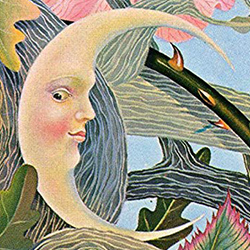 In the theatre magazine The Stage, Tony Smith was quoted as saying: "We are opening in the USA because Americans are more open to new ideas and the public will pay the money to see a new show". Typical case of "Think again!" The Broadway show never happened, but at least Masquerade premiered at London's Young Vic Theatre on 5 March 1982. With Roger Rees in the role of Jack Hare, Sarah Brightman as Tara Treetops and Sinitta Renet, who had three top ten hits in the UK in the 80s, the cast was prominent.
In the theatre magazine The Stage, Tony Smith was quoted as saying: "We are opening in the USA because Americans are more open to new ideas and the public will pay the money to see a new show". Typical case of "Think again!" The Broadway show never happened, but at least Masquerade premiered at London's Young Vic Theatre on 5 March 1982. With Roger Rees in the role of Jack Hare, Sarah Brightman as Tara Treetops and Sinitta Renet, who had three top ten hits in the UK in the 80s, the cast was prominent.
The Actors:
The Sun: Maynard Williams
The Moon: Celena Duncan
The Frog: Robert Lang
Jack Hare: Roger Rees
Mrs. Pennypockets, a fortune teller of sorts: Gaye Brown
Tara Treetops: Sarah Brightman
The Practical Man: Desmond McNamara
Mrs. Fish: Gaye Brown
The Spirit of the Water: Chrissy Wickham
Weitere Darsteller: Madeleine Loftin, Alan Radcliffe, Sinitta Renet, Mark Tyme, Heavon, Voyd
The production was choreographed by Arlene Phillips - no relation or in-law of Anthony Phillips.
But the next setback was not long in coming: Nine days after the performance began, it became known that the jewelled rabbit at the centre of the book had already been found on 24 February 1982. This ultimately meant that the Masquerade musical was not performed again after 31 performances until today.
Background Story III: The Masquerade-Demos
Ant had put aside the Masquerade pieces, which he thoroughly enjoyed, for work on 1984. 1984 was completed in March 1981 and the Masquerade compositions returned to centre stage from April to June 1981. Ant felt that he was not the right person to write the song lyrics and hired Richard Scott for this. He recalls: "I’d had a go at doing the words but it really wasn’t from the heart with a lot of these songs and so I found writing that way very difficult. To work like a professional lyric writer and take any subject and write about it isn’t really my strong point and so I was quite happy to pass them on to Richard. I liked the idea of finales and bringing themes together as it’s a lot like a concert in a way but with more freedom to act out parts because of the story line".
For this new engagement with Masquerade, Ant decided to re-record all the tracks, opting to use all or part of the ARP 600, the Polymoog and the Roland CR 78 drum box - the same instruments he had used for the first phase of from 1984. He not only rearranged the songs that he felt had worked best in the first version of the musical, but also wrote more pieces while Richard Scott dealt with the plot and characters to give structure to the whole project.
Recording for the new versions began with the instrumental backing tracks in April 1981 at Send Barns. Richard Scott assisted Ant with the technical editing of some of the tracks. This was followed by the recording of the vocals, for which Scott's friend Lindsey Moore was recruited.
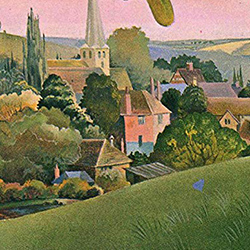 After recording and mixing the demos, Ant turned his attention to what would become the next Private Parts and Pieces album, subtitled Antiques. Ant recalls that his manager at the time, Tony Smith, was quite positive about some of the finished songs. As the Masquerade musical had already been written by Rod Argent at that point, Tony suggested that the songs should be reworked and make the basis of a musical based on Lewis Carroll's novel The Hunting Of The Snark. He later suggested the Alice novels by the same author. Ant and Richard took up the project in February 1982. This eventually resulted in the musical Alice (see and listen to Archive Collection Volume II, Disc 2, Tracks 7 and 13).
After recording and mixing the demos, Ant turned his attention to what would become the next Private Parts and Pieces album, subtitled Antiques. Ant recalls that his manager at the time, Tony Smith, was quite positive about some of the finished songs. As the Masquerade musical had already been written by Rod Argent at that point, Tony suggested that the songs should be reworked and make the basis of a musical based on Lewis Carroll's novel The Hunting Of The Snark. He later suggested the Alice novels by the same author. Ant and Richard took up the project in February 1982. This eventually resulted in the musical Alice (see and listen to Archive Collection Volume II, Disc 2, Tracks 7 and 13).
Ant felt it was a shame that almost all the material from Masquerade had not seen the light of day since it was written and recorded. And so he decided to record piano versions of two pieces and release them on Ivory Moon, the sixth album in the Private Parts & Pieces series, in the summer of 1985.
A release of the original Masquerade demos had been discussed for some time. Ant's former record company Voiceprint had expressed interest and had already listed Masquerade as an upcoming album title in the late 1990s. Ant and Richard Scott were cautious about this, however: would what had always been intended for a musical rather than an album project work as a CD release? And so, unfortunately, the pieces remained in the drawer for the umpteenth time.
In 2008, the original 8-track masters of the demos Ant had written for the first version of the musical in 1980 were found in his archive. These first went into the oven (!). The moisture that had penetrated could be "steamed out" by means of this highly sensitive process at 50-60 degrees and the destruction of the water-attracting glue layer could be largely reversed. The recordings were then digitised. When the 1980 tapes were transferred, it was discovered that five of the demos, including the original versions of Moon, Sun and Tara's Theme, no longer existed, as these tapes had been re-used by Ant in reworking them for a later project in 1982.
On the fifth CD of the Archive Collection Volume I & II re-release, the best demo versions from Phase 1 (January 1980) and Phase 2 (April-June 1981) of the Masquerade project are now heard. As the original multi-track master for Craw's demo no longer exists, a remixed instrumental version of the track was selected as one of the potential tracks for Alice recorded in November 1983. The only demo with vocals included here is Moon's Lament for The Sun, sung by the late Lindsey Moore, who died far too young.
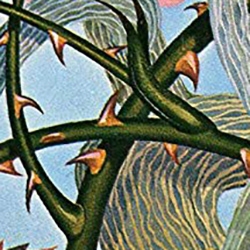 Of the new demo recordings, which were made from April to June 1981, there is a bootleg with the title Masquerade Demos, which one could acquire years ago with a lot of luck at the now rare record fairs. In contrast to the now officially released versions, the 1981 recordings, with one exception (Overture), all feature vocals - according to the credits on the cover by Richard Scott, Lindsey Moore and Anthony Phillips. In an interview, Ant explicitly names Richard Scott as the singer on the song Magic Carpet. On several tracks (see track list) Richard Scott can also be identified almost without a doubt as the singer. Anthony Phillips is listed as the singer, but this does not stand up to intensive listening.
Of the new demo recordings, which were made from April to June 1981, there is a bootleg with the title Masquerade Demos, which one could acquire years ago with a lot of luck at the now rare record fairs. In contrast to the now officially released versions, the 1981 recordings, with one exception (Overture), all feature vocals - according to the credits on the cover by Richard Scott, Lindsey Moore and Anthony Phillips. In an interview, Ant explicitly names Richard Scott as the singer on the song Magic Carpet. On several tracks (see track list) Richard Scott can also be identified almost without a doubt as the singer. Anthony Phillips is listed as the singer, but this does not stand up to intensive listening.
Tracklist of The Masquerade Demos (Bootleg):
1. Overture (Instrumental) (2:52)
2. Moon (3:28)
3. Sun (6:33)
4. Hare (3:17)
5. Tara [Tara's Theme] (3:47)
6. Craw( 2:06)
7. All Horrors [All Horrors Of The Night] (3:45)
8. Moonrise [expanded version of Silver Song] (3:27)
9. Masquerade (5:13)
10. Fire (6:10)
11. Sir Isaac Newton (3:52)
12. Magic Carpet [Yellow Carpet] (2:52)
13. Moonfall [Moon's Lament For The Sun] (4:20)
14. Finale [Only A Dream] (3:36)
The Masquerade Tapes - First Release 2022
What comes across here so inconspicuously as "Disc Five" is nothing other than a new Anthony Phillips album with fifteen pieces from the planned musical Masquerade, from which we have so far only heard the following:
Tara's Theme (piano version) on Private Parts And Pieces VI: Ivory Moon
Moonfall (piano version) on Private Parts And Pieces VI: Ivory Moon
The Princess Waltz on Private Parts And Pieces I-IV: Extra Pieces
Moonfall (Demo) on Private Parts And Pieces V-VIII: Extra Pieces II
Sir Isaac (piano version) on Private Parts And Pieces V-VIII: Extra Pieces II
In addition, there is:
Arboretum Suite: (iv) Lights On The Hill (Instrumental of the unreleased track Masquerade) on Private Parts And Pieces IV: A Catch At The Tables.
Lights On The Hill eventually became Masquerade. And the song Masquerade eventually became Walls And Bridges in the Musical Alice. In fan circles, there is a recording of Walls and Bridges.
But now let's have a look at the tracks on CD 5 of the Archive Collection reissue:
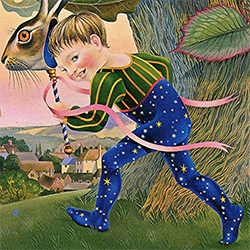 1. Overture (2:53)
1. Overture (2:53)
Keyboard arpeggios in the intro, at 0:20 a bass line is added, from 0:40 Alan Parsons-like chords. From 1:12 it sounds like Anthony Phillips of the early eighties, which is probably because this piece was written and recorded in the early eighties. From 1:25 a high keyboard melody follows, from 1:35 it becomes more rhythmic. From 2:02 the electric guitar takes over the melody. From 2:30 on, after a change of rhythm, the piece builds up to the finale. It's unbelievable what you can pack into a three-minute overture.
2. Moon (3:31)
For the most part, the playback for the song of the female "Moon", one of the main characters in the book and the musical, sounds relaxed and cheerful. In the middle section (from 2:15), the piece changes to a lively waltz rhythm, only to return to the first part at a slightly slower musical pace.
3. Sun (6:35)
Ominous keyboard sounds at the beginning. The acoustic guitar dissolves the menace. Guitar themes and moods alternate. From 1:43, the piece sounds more rhythmic and densely arranged. From 4:12 it becomes dark and ominous again. A very interesting, varied playback for the song of the male "Sun", the second main character of Masquerade.
4. Tara's Theme (3:25)
In the story, Jack Hare meets Tara Treetops and her friend, the raven Crow. Tara's Theme, which sounds a little like the theme music of an early evening series, is already familiar to us from the piano version on Private Parts And Pieces VI: Ivory Moon. The demo version is more lushly orchestrated and also pleases in this arrangement. Both versions of this playback have their special charm and will find their place in the world of the Anthony Phillips audience.
5. Craw (2:05)
A ragtime with a touch of Golliwogg's Cake-Walk from Debussy's Children's Corner, in which the raven Crow prances across the stage in front of the inner eye, only to pause at the end. This piece is played by Ant exclusively on the piano. On the officially unreleased bootleg version from 1981, Richard Scott (?) sings with a South American accent. From today's perspective, probably completely politically incorrect.
6. All Horrors Of The Night (4:26)
A brilliant, rhythmic piano piece with an intro in 6/4 time, which does not spread as much fear and terror as the title would have us believe. As a listener, one wonders why this grandiose composition had to wait so long for its release. If you listen very closely, you will notice the noises produced by Ant's long guitarist's fingernails. An unsolvable dilemma for musicians who play guitar and piano. In the story, the moon disregards the laws of gravity and causes fear and terror among humans and animals when it leaves its orbit.
7. Penny Pockets (3:24)
Ant rises from the piano stool and courageously picks up the guitar, or guitars. Like Moon, Penny Pockets is characterised by a positive atmosphere, which is only gently masked by a short minor passage in the middle section. In the story, Jack Hare meets the Penny Pockets Lady, who helps him in his search for the Sun.
8. Hare B Minor (2:43)
Ant moves his fingers across the piano with great virtuosity in this piece as well. For a piano piece in a minor key, Hare B Minor contains an astonishing number of major notes. We generously ignore a few small rhythmic wobbles in Ant's playing. It is "only" a demo. Here, too, you can hear Ants' fingernails "clacking" on the keys. The fade-out is unpleasant. But aren't fade-outs almost always unattractive? "A piece must have an ending" says the music analyst Hans Tausendfischler. He is right.
9. Destiny (3:49)
An almost anthemic, piano-heavy piece with more than a hint of Beatles and From Genesis To Revelation. The demo just begs for further elaboration.
10. Fire (4:43)
A percussive piano piece with many changes of time, rhythm and tempo, which can easily be imagined in an arrangement for orchestra and wind instruments. In the story, Jack Hare meets The Practical Man, who starts a fire with a burning glass.
11. Yellow Carpet (3:16)
The unreleased song Magic Carpet developed from the playback Yellow Carpet. The cranky guitar solo from 1:36 onwards gives the piece its special touch. From 2:29 on, Roland's drum machine (CR78 - not to be confused with CR7) is in top form. In the story, Jack Hare receives advice from the spirit of the water to run across a yellow carpet on the riverbank on his way to the sun.
12. Masque Moon (4:27)
A two-part, majestically solemn piano piece that could become a hymn when elaborated.
13. Moon's Lament For The Sun (4:23)
A little bit of Mad Man Moon resonates when Lindsey Moore turns this wistful and beautiful lament of the Moon to her beloved Sun into another highlight of the Masquerade demos with her sensitive singing.
14. Last of the Heavy Hares (4:02)
A lively, melody-rich piece in the familiar Anthony Phillips synthesizer sound of the early eighties.
15. Only A Dream (3:37)
The last of a total of 101 (!) pieces that come to our ears in the lush Archive Collection Volume I & II. This demo, which is already quite elaborate, noticeably lacks the melody lines and vocals that should only be heard in the (still?) unreleased song Finale.
All in all:
It is inexplicable why Anthony Phillips withheld the extremely impressive Masquerade demos from us for so long. All the more pleasing that this has now finally happened. Unfortunately, we are denied an official release of the highly interesting 1982 demos, which only a handful of fans know through the ultra-rare bootleg described above. Why were the Masquerade demos from both recording phases not released as an archive double album? This will then presumably be nicely distributed as usual on various Private-Parts-And-Pieces-And-Missing-Links-Extra-Bonus-Special-Limited-Release-Editions. Oh, Ant, don't make it so difficult for us!
Archive Collection Volume I & II is available via CherryRed.

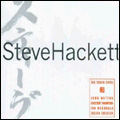

Live-Doublealbum with guest musicians such as Chester Thompson, John Wetton and Ian McDonald.
Review available